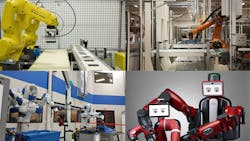The lazy narrative that everything Google throws money and brainpower at will turn to gold took a hit on Thursday when Bloomberg News reported the search giant had put its Boston Dynamics robot unit up for sale.
Google, known as Alphabet since last year, has some brilliant minds working on robotics and it is inspiring that a company is willing to take bold bets on technologies like humanoid robots that won’t pay off for years.
But just as Google’s robot car project doesn’t automatically mean incumbent automakers will be swept aside — Daimler’s S-Class saloon is already capable of driving pretty much by itself — Google’s robotics retreat is confirmation that building complex machines that earn their cost of capital is tough. Even so, European and Japanese competitors are thriving.
Although service robots — lightweight machines that, for example, milk cows or help in operating rooms — are making inroads, the most valuable market for robots remains the industrial sector. Think big, robotic arms behind a safety barrier in a factory.
The industrial robot industry generated about $13 billion in revenue 2015 and a further $25 billion in software, controllers and systems engineering, according to Morgan Stanley. In contrast, the market for domestic service robots was worth about $2.2 billion in 2014, according to the International Federation of Robotics.
A handful of companies with roots in building robots for automobile production lines dominate the industrial robot world — among them Germany’s Kuka, ABB of Switzerland as well as Japan’s Fanuc and Yaskawa.
What they do is far less sexy than Google’s efforts at building a robot that looks like a horse or can resist torment by a malevolent human. But their tight focus on making companies run more efficiently is paying off.
Kuka’s shares have gained more than five-fold over the past five years and touched a record this week amid takeover speculation (China’s Midea has been buying shares, but it remains unclear to what end). Thanks to lean production techniques, Fanuc’s operating margins exceed 40%, according to Bloomberg data.
These companies rightly take Silicon Valley’s software expertise seriously and are working to boost their own capability and make their robots more intuitively programmable. Advances in computing power, software and sensors mean in future robots will also become much cheaper, and more capable, and here again the incumbents need to watch their backs.
New entrants like Universal Robots and Rethink Robotics, which make lightweight robots that work side by side with humans on production lines (as opposed to behind a safety cage), have enjoyed considerable success in growing sales and show the nature of the threat. Universal Robots was acquired by Teradyne for $285 million last year.
Barclays estimates the collaborative robot market could be worth $3 billion by 2020 and more than $10 billion by 2025. But the incumbents have developed co-bots of their own: meet ABB’s Yumi and Kuka’s LBR iiwa.
Ultimately, knowing your customer’s needs remains invaluable, even at a company like Google that likes to take a longer term view.
That’s why Amazon’s $775 million purchase of Kiva Systems in 2012 looks in hindsight a more astute buy than Boston Dynamics. Amazon saw an immediate use for Kiva’s warehouse bots — they could replace humans in fetching goods at its warehouses — and pounced.
It’s also why, for all the fuss about the threat of disruption from Silicon Valley, one shouldn’t write off European and Japanese industrial companies just yet.
By Chris Bryant
About the Author
Bloomberg
Licensed content from Bloomberg, copyright 2016.
